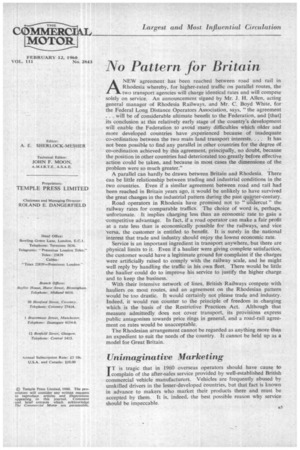No Pattern for Britain
Page 39

If you've noticed an error in this article please click here to report it so we can fix it.
ANEW agreement has been reached between road and rail in Rhodesia whereby, for higher-rated traffic on parallel routes, the two transport agencies will charge identical rates and will compete solely on service. An announcement signed by Mr. J. H. Allen, acting general manager of Rhodesia Railways, and Mr. C. Boyd White, for the Federal Long Distance Operators Association, says, "the agreement . . . will be of considerable ultimate benefit to the Federation, and [that] its conclusion at this relatively early stage of the country's development will enable the Federation to avoid many difficulties which older and more developed countries have _experienced because of inadequate co-ordination between the two main land transport interests. • . . It has not been possible to find any parallel in other countries for the degree of co-ordination achieved by this agreement, principally, no doubt, because the position in other countries had deteriorated too greatly before effective action could be taken, and because in most cases the dimensions of the problem were so much greater."
A parallel can hardly be drawn between Britain and Rhodesia. There can be little relationship between trading and industrial conditions in the two countries. Even if a similar agreement between road and rail had been reached in Britain years ago, it would be unlikely to have survived the great changes in the industrial pattern during the past quarter-century. Road operators in Rhodesia have promised not to " undercut " the railway rates for comparable traffics. The choice of word is, perhaps, unfortunate. It implies charging less than an economic rate to gain a -competitive advantage. In fact, if a road operator can make a fair profit at a rate less than is economically possible for the railways, and vice -versa, the customer is entitled to benefit. It is surely in the national interest that trade and industry should enjoy the lowest economic rate.
Service is an important ingredient in transport anywhere, but there are physical limits to it. Even if a haulier were giving complete satisfaction, the customer would have a legitimate ground for complaint if the charges were artificially raised to comply with the railway scale, and he might well reply by handling the traffic in his own fleet. There would be little the haulier could do to improve his service to justify the higher charge and to keep the business.
With their intensive network of lines, British Railways compete with hauliers on most routes, and an agreement on the Rhodesian pattern would be too drastic. It would certainly not please trade and industry. Indeed, it would run counter to the principle of freedom in charging which is the basis of the Restrictive Practices Act. Although that measure admittedly does not cover transport, its provisions express public antagonism towards price rings in general, and a road-rail agree ment on rates would be unacceptable. , The Rhodesian arrangement cannot be regarded as anything more than an expedient to suit the needs of the country. It cannot be held up as a model for Great Britain.




















































































































